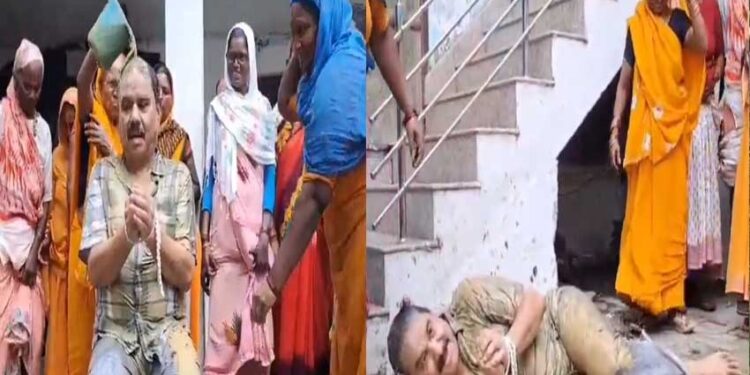Sarat Chandra Chattopadhyay (English: Sarat Chandra Chattopadhyay, born: 15 September, 1876; died: 16 January, 1938) was an immortal story writer and a famous novelist of Bangla. He was born on 15 September 1876 in Devanandpur village of Hooghly district. Sarat Chandra was one of the nine children of his parents. Sarat Chandra passed 12th at the age of eighteen. Sarat Chandra wrote a novel named ‘Basa’ (Home) during these days, but this work was not published.[1] Leaving his college studies midway, he went to Burma (present day Myanmar) as a clerk with a salary of thirty rupees per month. The element of popularity in the form in which Sharat Chandra Chattopadhyay’s fiction was presented has only increased the taste of his readers. Sharat Chandra Chattopadhyay is also the only Indian storyteller on whose most of his classic works films were made and many serials were also made. This has happened repeatedly with his works Devdas, Charitraheen and Shrikant.
Sharat Chandra Chattopadhyay entered the field of literature with realism. This was almost a new thing in Bengali literature. Sharat Chandra Chattopadhyay attacked social conventions in his popular novels and stories and forced people to think beyond the beaten track.
Sharatchandra’s talent can be seen in his novels as well as his stories. Like his novels, his stories also depict the reality of middle class society. Sharatchandra was a master of love. Sharatchandra’s stories have a strong depiction of love and man-woman relationships. Some of his stories are very touching from the artistic point of view. These stories represent the complete emotions of Sharat’s heart. He has picked up stories from his childhood memories and from the lives of friends and other people he came in contact with. It seems as if these stories are a part of our lives.
Mahatma Gandhi had said- “Hate the sin, not the sinner.” World-renowned Bengali story writer Sharat Chandra Chattopadhyay had put the above statement of Gandhiji into his literature. He gave voice to the pain of the fallen, the promiscuous, the oppressed and the tortured woman in his works.[2]
Sharatchandra had great respect for women and he was a true connoisseur of women’s hearts. In his stories, the subtle, true and psychological portrayal and analysis of the mysterious character of a woman, her tender emotions, suppressed desires, incomplete hopes, unfulfilled aspirations, her small dreams, small and big mental complications and her ambitions is rare elsewhere.[2]
Sharatchandra’s entire literature is filled with the tragic stories of women’s rise and fall and fall and rise. Sharatchandra does not only sing the tale of the downfall of the oppressed and tortured woman in his stories, he does not only tell the story of her becoming a fallen and a prostitute, he also tells the sacred story of her affection, sacrifice, sacrifice, affection and love. In Sharatchandra’s stories, both the lowest and the greatest forms of women are seen together. When Sharatchandra, while telling the story of the downfall of women, reveals the noble and bright character of the same woman, the reader is stunned. This question gets deeply embedded in his mind that how can a single woman have two forms and he is unable to understand which form of woman he should accept. The skill with which Sharatchandra unravels the knots and tangles of the heart of women in his stories, the multi-faceted forms of women that come out in his works, such a glimpse is not found anywhere in world literature.[2]
Sharatchandra has written many novels, the most important among them are Pandit Moshai, Baikunther Bill, Mej Didi, Darpachoorn, Abhaagini Ka Swarg, Shrikant, Arakshaniya, Nishkriti, Mamalar Phal, Anupama Ka Prem, Grihadah, Shesh Prashna, Dutta, Devdas, Brahmin Ki Ladki, Sati, Vipradas, Dena Pavana etc. He wrote the novel ‘Pather Daavi’ on the revolutionary movement of Bengal. Sharat’s novels have been translated into many Indian languages. English films based on some of Sharatchandra’s novels have also been made several times. In 1974, a film based on his novel ‘Charitraheen’ was made. After that, the film Devdas has been made three times based on Devdas. The first Devdas (1936) starred Kundan Lal Sehgal, the second Devdas (1955) starred Dilip Kumar, Vaijayanti Mala and the third Devdas (2002) starred Shahrukh Khan, Madhuri Dixit, Aishwarya Rai. Besides this, films have also been made on Charitraheen (1974), Parineeta (1953 and 2005), Badi Didi (1969) and Manjhali Behan (1969) etc.
Sharatchandra Babu gave man his dignity through his prolific writings and destroyed those so-called traditions of society, under which the eyes of women are always filled with unwanted tears. Sharat Babu observed the wailings and cries of the deprived which remained unheard by the society and came to know that a large section of the population is being ousted from the category of humans in the name of caste, lineage and religion etc. Through his writings, he made a constructive intervention on the so-called social ‘consensus’ that was developing under this conspiracy, due to which he became the favorite wordsmith of millions of readers. He not only depicted the grey life of women and other oppressed communities, but also spread the shades of rainbow colors covered in their common life. Sharat has a rare contribution in taking love to spirituality. Sharat-Sahitya has proved to be a helpful herb in enlivening the life of the common man.[3]
Famous novelist Sharat Chandra Chattopadhyay died on 16 January 1938. Sharat Chandra Chattopadhyay has the distinction that his works are still read with great interest in all Indian languages including English. In terms of popularity, Bankim Chandra Chatterjee and Sharat Chandra are even ahead of Rabindranath Tagore.










